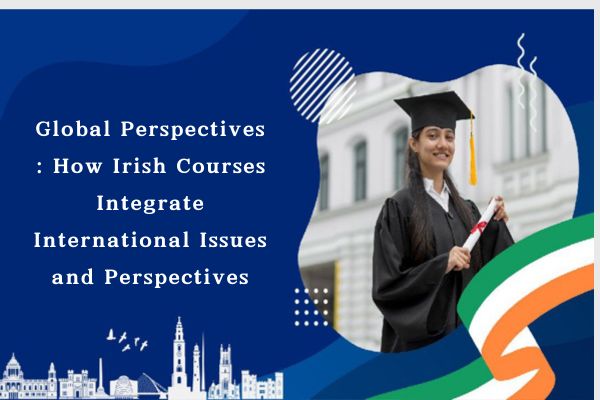As the world becomes more interconnected, understanding global issues and diverse perspectives is essential for preparing students for the future. Irish educational institutions are increasingly embedding international issues into their curricula, offering students a well-rounded perspective on global challenges and opportunities. This approach not only broadens their academic experience but also equips them with the skills needed for a globalized world. Here’s a closer look at how Irish courses are integrating international perspectives and what sets them apart.
1. Innovative Curriculum Integration
Multidisciplinary Approaches: Irish universities are pioneering in creating multidisciplinary programs that blend traditional subjects with global issues. For example, a course in environmental studies might integrate modules on international climate agreements, global sustainability practices, and comparative environmental policies. This allows students to understand how environmental issues are addressed worldwide and to evaluate different approaches critically.
Global Themes in Core Subjects: Many Irish courses now include global themes as part of their core subjects. In literature courses, students might analyse works from different cultures to understand global narratives and themes. Similarly, history courses might include a comparative study of historical events from multiple perspectives, offering a nuanced view of global historical developments.
2. Case Studies with a Global Lens
International Case Study Methodology: Irish institutions are increasingly employing international case studies to give students practical insights into global issues. For instance, in business studies, students might work on case studies involving multinational corporations, examining how these companies navigate various regulatory environments and cultural contexts. This hands-on approach helps students understand the complexities of global business practices.
Cross-Border Collaboration Projects: Collaborative projects with international universities are becoming a staple in Irish courses. For example, students might work on joint research projects with peers from institutions in other countries, tackling global challenges such as poverty reduction, technological innovation, or public health. This collaborative approach not only provides diverse perspectives but also fosters cross-cultural teamwork skills.
3. Enhanced Global Engagement Opportunities
International Virtual Exchange Programs: In addition to traditional exchange programs, Irish institutions are embracing virtual exchanges, where students engage with peers from around the world through online platforms. These virtual exchanges often involve joint assignments, discussions on global issues, and shared research projects, enabling students to gain international experience without leaving their campus.
Global Immersion Projects: Some Irish courses now include global immersion projects where students participate in fieldwork or internships abroad. These projects offer real-world experience and deeper cultural immersion. For instance, a course in international development might involve a field placement in a developing country, allowing students to work on projects related to global development goals.
4. Incorporating Global Perspectives through Technology
Digital Humanities and Global Research: Irish institutions are leveraging technology to enhance the study of global issues. For example, digital humanities projects that analyse global historical data or cultural artifacts help students understand how different societies have interacted and influenced one another over time. Tools like data visualization and geographic information systems (GIS) are used to present complex global issues in accessible ways.
Online Global Learning Platforms: Many Irish courses are incorporating online platforms that provide access to global content and perspectives. Platforms such as MOOCs (Massive Open Online Courses) offer students the opportunity to take courses from international experts and institutions, broadening their knowledge base and understanding of global issues.
5. Focus on Global Citizenship and Ethics
Ethics and Global Responsibility: A growing number of Irish courses are integrating discussions on global ethics and responsibility. For example, courses in social sciences and humanities might explore topics such as global justice, human rights, and ethical considerations in international policy. This focus helps students develop a sense of global responsibility
and encourages them to think critically about their role in the world.
Community Engagement with a Global Perspective: Irish institutions are also encouraging students to engage with global issues through community-based learning. Students might work on local projects that have international implications, such as initiatives related to refugee support, climate action, or global health. This approach links academic learning with real- world impact, fostering a deeper understanding of global issues and their local relevance.
Irish educational institutions are leading the way in integrating international issues and perspectives into their courses, reflecting the growing importance of global awareness in today’s world. Through innovative curriculum design, international case studies, global engagement opportunities, and a focus on ethics and global citizenship, Irish courses are preparing students to navigate and contribute to a complex global landscape. This comprehensive approach not only enhances students academic experience but also equips them with the skills and knowledge needed to address global challenges effectively.
Courses that integrate international issues and perspectives offer several advantages for international students in terms of job readiness and career development. Here’s how:
1. Enhanced Global Competence
- Cross-Cultural Skills: By studying diverse perspectives and global issues, students develop strong cross-cultural communication skills. These are highly valued by employers who operate in international markets or have diverse teams.
- Adaptability: Exposure to global contexts helps students become more adaptable and open to working in different cultural settings, making them attractive candidates for multinational companies.
2. Informed Problem-Solving
- Global Awareness: Courses that cover international issues prepare students to tackle problems with a global perspective. This is crucial for roles that involve international business, global strategy, or policy-making.
- Innovative Thinking: Understanding different approaches to global challenges can foster innovative thinking and problem-solving skills, which are beneficial in dynamic and competitive job markets.
3. Broader Career Opportunities
- International Organizations: Students with a strong grasp of global issues are well-prepared for careers in international organizations, NGOs, and diplomatic services.
- Multinational Companies: Companies with international operations value employees who understand global markets and can navigate cross-border issues effectively.
4. Networking and Professional Connections
- Global Network: Engagement in international projects, exchanges, and conferences helps students build a global professional network, which can be instrumental in job searching and career advancement.
- Industry Connections: Guest lectures, seminars, and collaborative projects often involve industry professionals and experts, providing students with valuable contacts and insights into their chosen fields.
5. Enhanced Resume and Skill Set
- Resume Strength: International experience and coursework on global issues can make a resume stand out. Employers appreciate candidates who have demonstrated an ability to understand and engage with diverse environments.
- Transferable Skills: Skills such as cross-cultural communication, international market analysis, and global problem-solving are transferable across various industries and roles.
6. Preparation for Global Challenges
- Understanding Global Trends: Students learn to analyse and anticipate global trends and issues, which is useful for roles that involve strategic planning, market analysis, or international relations.
- Policy and Strategy Development: For those interested in policy-making or strategic roles, understanding international perspectives provides a solid foundation for developing policies or strategies that address global challenges.
7. Cultural Sensitivity and Inclusion
- Workplace Inclusivity: Experience with diverse perspectives prepares students to contribute to inclusive workplaces and engage effectively with colleagues and clients from different backgrounds.
- Leadership Skills: Many courses emphasize leadership and team dynamics in a global context, helping students develop skills necessary for leading diverse teams.
8. Practical Experience
- Internships and Projects: Some programs offer internships or projects with international companies or organizations, providing hands-on experience in global business practices or international development.
- Field Work: Courses that include fieldwork or study abroad programs give students practical experience in international settings, enhancing their understanding and employability.
In summary, integrating international issues and perspectives into courses equips international students with valuable skills and experiences that are highly relevant in the global job market. This preparation enhances their employability and helps them stand out in competitive fields.
“Want to stay ahead with more insightful tips and valuable resources? Connect with us at Focus Education for personalized guidance and expert advice tailored to your needs. We’re here to support your educational journey every step of the way!”



